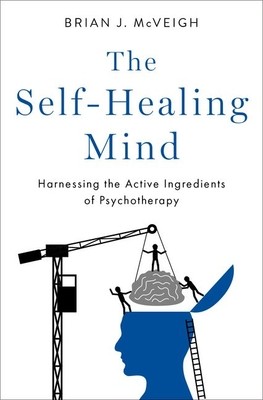
- We will send in 10–14 business days.
- Author: Brian J McVeigh
- Publisher: Oxford University Press, USA
- ISBN-10: 0197647863
- ISBN-13: 9780197647868
- Format: 16.1 x 23.8 x 2.7 cm, kieti viršeliai
- Language: English
- SAVE -10% with code: EXTRA
Reviews
Description
Evolutionary psychology explains why some mental illnesses developed, but to answer questions about how to improve our mental well-being in the face of these challenges--how the mind works to heal itself-we should look to more recent changes in mentality.
In The Self-Healing Mind, mental health counsellor and anthropologist Brian J. McVeigh postulates that around 1000 BCE, population expansion and social complexity forced people to learn conscious interiority--a package of cognitive capabilities that culturally upgraded mentality. He argues that the mental processes that help us get through the day are the same ones that can heal our psyches. Adopting a common factors and positive psychology perspective, McVeigh enumerates and defines these active ingredients of the self-healing mind: mental space, introception, self-observing and observed, self-narratization, excerption, consilience, concentration, suppression, self-authorization, self-autonomy, and self-reflexivity. McVeigh shows how these capabilities underlie the effectiveness of psychotherapeutic techniques and interventions. Though meta-framing effects of psyche's recuperative properties correct distorted cognition and grant us remarkable adaptive abilities, they sometimesspiral out of control, resulting in runaway consciousness and certain mental disorders. This book also addresses how maladaptive processes snowball and come to need restraint themselves. With insights from counseling, psychotherapy, anthropology, and history, The Self-Healing Mind will appeal to practitioners, researchers, and anyone interested in neurocultural plasticity and how therapeutically-directed consciousness repairs the mind.
EXTRA 10 % discount with code: EXTRA
The promotion ends in 22d.01:15:19
The discount code is valid when purchasing from 10 €. Discounts do not stack.
- Author: Brian J McVeigh
- Publisher: Oxford University Press, USA
- ISBN-10: 0197647863
- ISBN-13: 9780197647868
- Format: 16.1 x 23.8 x 2.7 cm, kieti viršeliai
- Language: English English
Evolutionary psychology explains why some mental illnesses developed, but to answer questions about how to improve our mental well-being in the face of these challenges--how the mind works to heal itself-we should look to more recent changes in mentality.
In The Self-Healing Mind, mental health counsellor and anthropologist Brian J. McVeigh postulates that around 1000 BCE, population expansion and social complexity forced people to learn conscious interiority--a package of cognitive capabilities that culturally upgraded mentality. He argues that the mental processes that help us get through the day are the same ones that can heal our psyches. Adopting a common factors and positive psychology perspective, McVeigh enumerates and defines these active ingredients of the self-healing mind: mental space, introception, self-observing and observed, self-narratization, excerption, consilience, concentration, suppression, self-authorization, self-autonomy, and self-reflexivity. McVeigh shows how these capabilities underlie the effectiveness of psychotherapeutic techniques and interventions. Though meta-framing effects of psyche's recuperative properties correct distorted cognition and grant us remarkable adaptive abilities, they sometimesspiral out of control, resulting in runaway consciousness and certain mental disorders. This book also addresses how maladaptive processes snowball and come to need restraint themselves. With insights from counseling, psychotherapy, anthropology, and history, The Self-Healing Mind will appeal to practitioners, researchers, and anyone interested in neurocultural plasticity and how therapeutically-directed consciousness repairs the mind.


Reviews